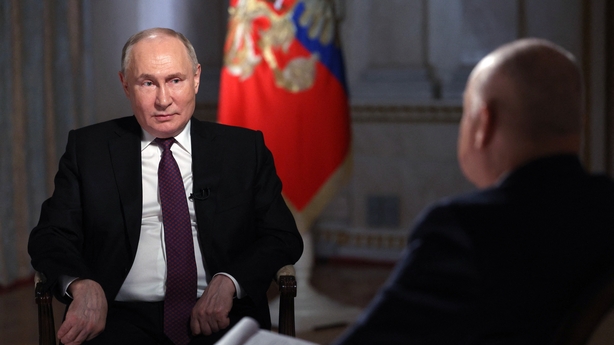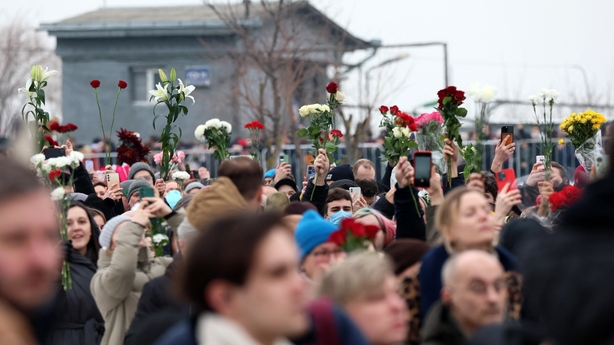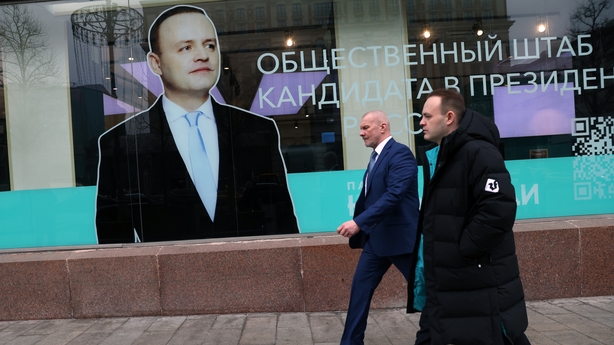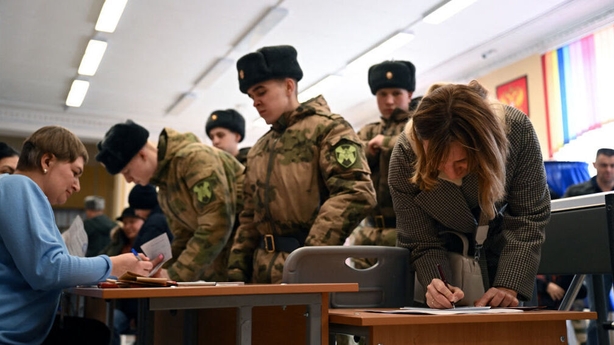Russians started voting in a presidential election yesterday which is taking place until polls close tomorrow evening.
The vote is expected to provide Vladimir Putin with a fifth term as president and enable him to stay in power until 2030.
There are three other candidates in the race, if it can be called that.
All are male, lack popular support and back the current president's policies, including the Kremlin's war in Ukraine.
There have been televised debates during the campaign, but as with past presidential elections over the past quarter of a century, Mr Putin has not taken part.
Nor has the current president presented an electoral manifesto to voters.

Mr Putin's speech to the Duma, Russia's parliament, last month and a one-on-one television interview with a friendly Russian journalist served as his campaign message to the Russian people.
In his two-hour speech to elected deputies on 29 February, Mr Putin made numerous references to what Russia's economy would look like by 2030, the year his next presidential term will end.
It was as if he had already won the vote.
Mr Putin, who has ruled Russia since 2000, has pitched himself as the guardian of economic stability and growth in times of conflict with Ukraine and the West.
On Thursday, he spoke to Russians in a televised address and urged them to use their "right to vote".
Holding regular presidential elections in Russia is a "kind of ritual of legitimisation of power," Igor Gretskiy, a Russian foreign policy analyst, told RTÉ News.
Mr Gretskiy, who now lives in Estonia, said the elections also serve as a "stress test" for Mr Putin's "vertical of power", a ruling system whereby all policy decisions are channeled upwards by local authorities to the Kremlin and the president for approval.
"The so-called elections, it's a crash test for the system"
The Kremlin, he said, pays close attention to efforts by the opposition to challenge its superiority during election campaigns.
Mr Gretskiy said Russia's "bureaucratic machine" and the so-called "siloviki" - Russia's law enforcement agencies - learn from the experience of elections in order to "solidify this vertical of power for the future".
Mr Putin and the Kremlin elite have tightened their control over this election like no other vote held over the past two decades.
Opponents of Mr Putin in previous presidential elections have never stood much of a chance, but voters were offered at least the facade of a race in the past.
The last free but "not very democratic" elections in Russia were in 1996, Agnieszka Legucka, a senior Russia expert in Warsaw, said.
"The so-called elections, it's a crash test for the system," said Ms Legucka, senior fellow at the Polish Institute of Foreign Affairs.
"The most important audience is the very close circle of ruling elites in Russia because if the system will work, this test will be effective.
"It means that there is no alternative to Putin so there will not be a split of the elite," said Ms Legucka.
This time around, there really is no alternative to Mr Putin.
Two independent candidates - Yekaterina Duntsova and Boris Nadezhdin - were barred from campaigning in the race by Russia's central electoral commission.
Both were anti-war voices.
Mr Nadezhdin had collected more than 100,000 signatures supporting his candidacy, enough to secure a place in the race.
But the Kremlin feared that he could become a genuine opposition candidate capable of challenging Mr Putin.
The electoral commission's exclusion of Mr Nadezhdin in early February left Russia's exiled opposition - for which there are four main camps - without a candidate to back.
The four opposition groups have differed on the kind of strategy to pursue in this election, even after the death of opposition leader Alexei Navalny last month in an Artic prison colony.

Supporters of Mr Navalny's camp abroad are encouraging Russians at home to avoid online voting and instead, to vote in person at midday on 17 March, the final day of the election.
The action, called 'Noon against Putin' had been backed by Mr Navalny in January, just weeks before his death.
His widow, Yulia Navalnaya, has called on voters to take part in this act of electoral protest and to vote for any candidate other than Mr Putin, or to spoil votes.
However, Russian authorities have said that unauthorized mass events at polling stations will result in arrest, punishable by up to five years in prison.
Authorities have also encouraged Russians to vote online and this weekend's election is the first in which online voting will take place across the country's 11 time zones.
Mikhail Khodorovsky, the exiled Russian businessman and former oligarch who spent ten years in Russian jails for challenging Mr Putin's authority in the mid-2000s, has backed the 'Noon against Putin' initiative.
Mr Khodorovsky is one of Mr Putin's most vocal critics outside of Russia but it is difficult to assess how much support he has within the country itself.
Another prominent opposition activist Maxim Katz, who is a blogger now living in Israel, has urged Russians to vote for Vladislav Davankov, a 40-year-old candidate from the New People party, as an alternative to Mr Putin.

Mr Davankov is the least hardline of Mr Putin's so-called opponents and has called for peace talks with Ukraine.
However, he is not an overtly anti-war candidate either.
He supported the annexation of Crimea in 2014 and voted in favour of Russia's annexation of Ukraine's occupied territories.
Leonid Volkov, a former chief of staff to Mr Navalny, has criticised Mr Katz’s call for voters to back Mr Davankov on account of his voting record on annexed Ukrainian territory.
As a side note, Mr Volkov was attacked during the week by a person wielding a hammer outside his house in Vilnius.
The two other candidates include Nikolai Kharitonov, the leader of the Communist Party which takes the same hardline stance towards supporting Russia's war in Ukraine as Mr Putin's own political family, United Russia, the largest party in the Duma.
Adding to the sense of a non-contest, Leonid Slutski, the candidate for the Liberal Democratic Party, said in one television interview that he did not want to win the election.
Despite its name, Mr Slutsky's party supports neither liberalism nor democracy.
The lack of any hint of competitiveness has all but guaranteed Mr Putin another term in the Kremlin until 2030.

By that time, a 77-year-old Mr Putin will have ruled Russia for three decades, including his four-year stint as prime minister.
"This is quite a formality. Putin will win this election and the system does everything possible in order not to allow the so-called non-systemic opposition to intervene," said Mr Gretskiy, currently a research fellow at Estonia's International Centre for Defence and Security.
Mr Putin, he said, "sent a message" during his speech to the Duma last month that the war in Ukraine is "not only a way to earn money, but a way to to make a career".
"He's going to consolidate and renovate this vertical of power", he added, and "embrace people who have proved their loyalty" to the political regime during the war.
Yesterday Charles Michel, the outgoing president of the European Council, wryly congratulated Mr Putin on an election victory, two days before the final day of voting.
"Would like to congratulate Vladimir Putin on his landslide victory in the elections starting today. No opposition. No freedom. No choice," posted Mr Michel on X.
Russia's presidential election could almost be a political satire but for the fact that it is very real.
The next six years under Mr Putin will lead to a greater militarisation of Russian society and further repression, said Ms Legucka.
Mr Putin, she believes, has not named a successor because he is afraid of what will happen to him.
"That's why, there's this system based on fear. That's why it is so aggressive."
Read more: Dye, cyberattacks mar first day of Russia's presidential election







